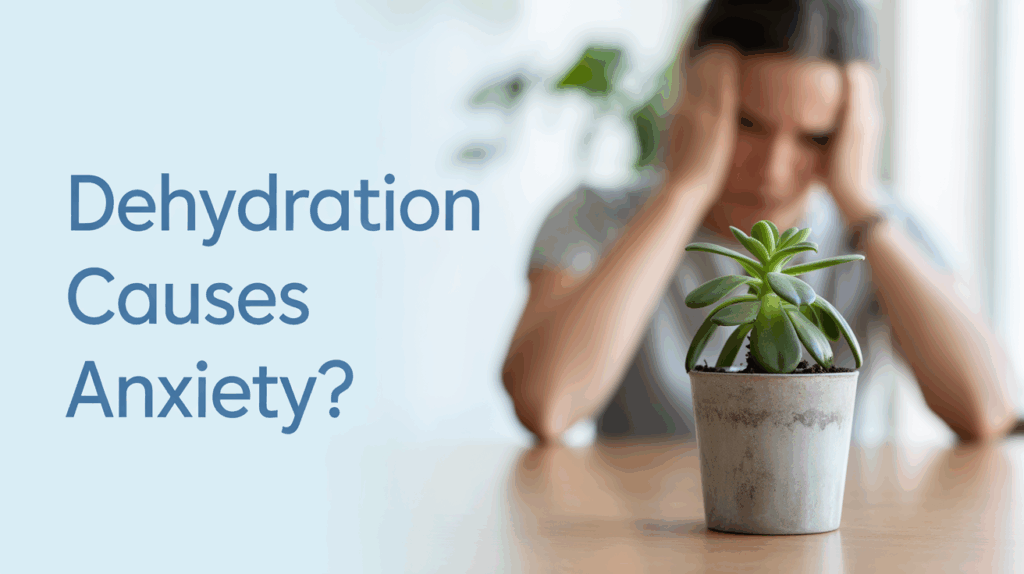Can Dehydration Cause Anxiety?
The Connection Between Dehydration and Anxiety
Dehydration occurs when the body loses more water than it takes in. This imbalance affects blood, brain, and hormones, which can influence mood and cognition. Research shows dehydration may worsen stress, worry, and even trigger anxiety disorder symptoms.
The brain depends on water for neurotransmitter function. When the body lacks hydration, serotonin and cortisol levels shift, increasing irritability, fear, and panic. Patients with generalized anxiety disorder may feel more lightheadedness, fatigue, and emotional distress when dehydrated.

How Dehydration Affects the Brain and Mood
The brain is over 70% water. Lack of hydration reduces oxygen flow and disrupts hormones like cortisol and serotonin. This can trigger racing thoughts, irritability, and sadness.
Even mild fluid loss impacts cognition, attention, and memory. Feeling fog or confusion can resemble anxiety symptoms. A mental health professional may recommend hydration strategies as part of therapy or mental health treatment.
Neurotransmitters and Stress Hormones
Neurotransmitters like serotonin regulate mood and happiness. Dehydration lowers serotonin production and raises stress hormones like cortisol. High cortisol leads to muscle tension, fast breathing, and stress.
This hormonal imbalance can create panic, dizziness, and even a panic attack. Tachycardia, palpitations, and increased heart rate can occur, mimicking anxiety disorder signs.
Physical Symptoms That Resemble Anxiety
Dehydration causes physical symptoms that overlap with anxiety. Patients may feel headache, weakness, dizziness, nausea, or shortness of breath.
Electrolyte imbalance affects sodium levels, leading to lightheadedness, confusion, and muscle cramping. This can raise blood pressure, trigger hypertension, or cause tachycardia, all of which fuel panic.
Digestive and Skin Effects
Dehydration impacts digestion and nutrient absorption. It can cause constipation, diarrhea, or vomiting, which worsen fatigue and stress. Poor digestion limits vitamin and nutrient delivery, affecting brain health.
Skin problems like psoriasis or dryness may increase body-focused worry. Patients often feel self-conscious about their skin, which worsens mood and emotion.
Lifestyle Factors That Link Dehydration and Anxiety
Climate, diet, and lifestyle habits all influence hydration. Hot weather and fever raise fluid loss. Exercise increases sweat and water needs, and skipping meals or drinking alcohol can worsen dehydration.
Caffeine and tea act as diuretics, increasing urine output. Excess sugar and poor nutrition reduce energy and trigger irritability. Patients with type 2 diabetes face higher dehydration risk due to glucose imbalances.
Substances and Dehydration
Substance abuse, alcohol, and certain drug use can increase dehydration. Medications and diuretics often change urine frequency and sodium balance. These side effects raise anxiety disorder symptoms.
Addiction to caffeine or alcohol creates cycles of dehydration and stress. This disrupts sleep, emotion, and relaxation, worsening anxiety.

Hydration Habits That Support Mental Health
Drinking water regularly improves mental health, mood, and energy. A simple habit like carrying a water bottle or using a water dispenser helps maintain balance.
Purified water or bottled water are convenient options, while adding fruit can encourage drinking. Patients may set reminders to drink a glass of water with every meal to maintain hydration.
Nutrition and Coping Strategies
A balanced diet with vitamins and nutrients supports hydration. Electrolytes like sodium and potassium restore fluid balance after exercise or illness. Good nutrition stabilizes mood and reduces fatigue.
Coping skills like meditation, relaxation techniques, and progressive muscle relaxation help manage stress. These approaches combine well with hydration and stress management to reduce anxiety.
Therapy and Mental Health Treatment for Anxiety
Hydration alone may not resolve an anxiety disorder. Patients often need therapy, medication, and mental health treatment for long-term relief.
A mental health professional or psychiatrist can evaluate symptoms, medical history, and lifestyle habits. Insurance often covers therapy, psychiatry, and medication management for anxiety.
Combining Treatment Approaches
Therapy methods such as cognitive behavioral therapy, meditation, and relaxation training improve coping. Stress management, sleep routines, and exercise help regulate the nervous system.
Mental health treatment also addresses co-occurring conditions like bipolar disorder, substance abuse, or cardiovascular disease. This comprehensive approach improves long-term health and reduces relapse risk.
How Revival Mental Health Can Help with Anxiety
At Revival Mental Health, we understand that anxiety affects more than just the mind—it influences sleep, health, energy, and daily behavior. Our treatment center in Orange County offers therapy, psychiatry, and stress management programs to help patients regain balance. With support from a mental health professional, patients can build healthier coping habits that improve mood, cognition, and lifestyle.
Our programs focus on individualized care, combining therapy with evidence-based treatment strategies. Whether anxiety is linked to dehydration, substance abuse, or deeper mental health concerns, our team provides long-term support. Patients benefit from relaxation techniques, medication management, and practical tools to handle stress and panic effectively.
Advanced Symptoms of Anxiety Beyond Hydration
While dehydration can mimic or worsen anxiety, more advanced symptoms often point to underlying mental health conditions. Patients may experience persistent worry, shortness of breath, and feelings of fear that interrupt sleep, work, and relationships. Racing thoughts, irritability, and avoidance behaviors may also indicate a more serious anxiety disorder.
Some patients develop physical health issues from chronic stress, including hypertension, cardiovascular disease, or digestive problems. In severe cases, anxiety may lead to panic disorder or generalized anxiety disorder, requiring therapy and structured mental health treatment. These advanced symptoms extend beyond hydration and often call for professional care.

Knowing When Anxiety Needs Treatment
It can be difficult for a patient to know when anxiety requires treatment. A general rule is that if fear, panic, or stress begins to disrupt daily life, therapy may be necessary. When coping strategies, relaxation techniques, and lifestyle adjustments do not bring relief, it may be time to consult a mental health professional.
Persistent symptoms such as palpitations, tachycardia, chronic fatigue, or racing thoughts signal that anxiety is affecting both the nervous system and overall health. In these situations, a psychiatrist or therapist can provide evaluation, information, and treatment options. Seeking mental health treatment early often prevents further complications and restores quality of life.
Research on Dehydration and Anxiety
Studies show even mild dehydration raises cortisol and reduces serotonin. This hormonal shift increases irritability, fatigue, and neuroticism, which are linked to anxiety.
Research highlights how dehydration impacts cognition, memory, and attention. Mental health professionals emphasize drinking water as part of lifestyle management for patients with generalized anxiety disorder.
Crisis Intervention and Severe Anxiety
In crisis intervention, dehydration may worsen panic or fear during emergencies. Shortness of breath, palpitations, and confusion can intensify panic attack symptoms.
Patients in crisis benefit from hydration, relaxation, and breathing exercises. Caregivers and health professionals can offer water, support, and information to reduce stress.
Practical Tips for Managing Anxiety and Hydration
Carrying a water bottle creates a healthy habit. Drinking water before meals, after exercise, and when feeling thirst prevents dehydration. Patients may use purified water, bottled water, or water dispensers for convenience.
Adding fruit to water increases flavor and encourages drinking. Small changes like keeping a glass of water on a desk or bedside table help patients avoid fatigue and fog.
Relaxation and Stress Management
Relaxation techniques like progressive muscle relaxation, meditation, and breathing control reduce stress hormones. Patients can combine these practices with healthy hydration for stronger results.
Lifestyle adjustments like better sleep, regular exercise, and balanced nutrition support hydration. These habits protect the cardiovascular system, improve digestion, and regulate blood pressure.
The Role of Caregivers and Mental Health Professionals
Caregivers play a vital role in patient hydration. They can remind patients to drink water, manage diet, and watch for signs of dizziness, headache, or nausea.
Mental health professionals provide therapy, psychiatry, and medication when anxiety persists. Insurance coverage may support treatment services and reduce financial pressure for patients and families.
Advertising and Information Awareness
Advertising often promotes bottled water or purified water for health. While marketing may encourage good drinking habits, patients should focus on balanced lifestyle choices.
Reliable information from health professionals, research, and clinics helps patients make informed decisions. Proper hydration, therapy, and stress management form a strong foundation for recovery.
Conclusion
So, can dehydration cause anxiety? Yes, dehydration affects the brain, hormones, and nervous system in ways that trigger stress, mood swings, and panic symptoms.
Drinking water, eating nutrient-rich meals, and avoiding excess alcohol, caffeine, and sugar support hydration and health. When paired with therapy, medication, and professional care, hydration becomes a key tool for managing anxiety disorder symptoms.
At Revival Mental Health, we recognize how lifestyle and physical health influence mental well-being. Our mental health treatment programs in Orange County combine therapy, psychiatry, and stress management strategies to help patients regain balance and reduce anxiety.
FAQs
1. How much water should I drink daily to support mental health? Most adults benefit from 8–10 glasses of water daily, but needs vary based on weight, exercise, and climate. A water bottle or water dispenser helps maintain consistency.
2. Can dehydration worsen other mental health conditions besides anxiety? Yes, dehydration can aggravate mood disorders such as depression or bipolar disorder by disrupting hormones, sleep, and brain function.
3. Is electrolyte water better than regular water for anxiety relief? Electrolyte water can help after exercise, fever, or illness. For daily hydration, purified water, bottled water, or filtered tap water are usually sufficient.
4. Does dehydration interfere with anxiety medications? Yes, dehydration can affect how medication is absorbed and may increase side effects like dizziness or headache. Always follow guidance from a psychiatrist or health professional.
FAQs
1. How much water should I drink daily to support mental health? Most adults benefit from 8–10 glasses of water daily, but needs vary based on weight, exercise, and climate. A water bottle or water dispenser helps maintain consistency.
2. Can dehydration worsen other mental health conditions besides anxiety? Yes, dehydration can aggravate mood disorders such as depression or bipolar disorder by disrupting hormones, sleep, and brain function.
3. Is electrolyte water better than regular water for anxiety relief? Electrolyte water can help after exercise, fever, or illness. For daily hydration, purified water, bottled water, or filtered tap water are usually sufficient.
4. Does dehydration interfere with anxiety medications? Yes, dehydration can affect how medication is absorbed and may increase side effects like dizziness or headache. Always follow guidance from a psychiatrist or health professional.





